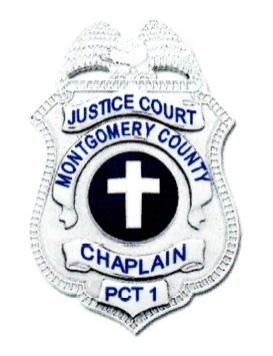 The Freedom From Religion Foundation’s ongoing challenge against a Texas judge’s imposed courtroom prayer has received a boost during the oral arguments stage in the appeals process.
The Freedom From Religion Foundation’s ongoing challenge against a Texas judge’s imposed courtroom prayer has received a boost during the oral arguments stage in the appeals process.The state/church watchdog won its court case last year over Montgomery County Judge Wayne Mack’s prayer in the courtroom. Plaintiffs FFRF and local attorney “John Roe” had sued Judge Wayne Mack over his divisive and unconstitutional practice of opening each court session with chaplain-led prayer. Mack, as a justice of the peace, has jurisdiction over minor misdemeanor offenses and civil matters involving up to $20,000, including juvenile cases. Montgomery County is north of Houston, and its county seat is Conroe.
The case is now before a three-member panel (Judges Jerry Edwin Smith, Kurt D. Engelhardt and E. Grady Jolly) of the 5th U.S. Circuit Court of Appeals. FFRF and Roe are represented by FFRF Associate Counsel Sam Grover, with Attorney Ayesha Khan of Washington, D.C., serving as co-counsel.
During recent oral arguments, Judge Jolly questioned Mack’s attorney about whether there was “voluminous” evidence of prayers in courtrooms. Jolly also asked what the most recent example in this country was of having a prayer in court. In reply, Attorney Brad Hubbard disingenuously replied, “There was one here this morning,” in reference to the court’s opening cry. When Hubbard also referenced the conclusion of the Supreme Court’s opening cry, “God save the United States and this honorable court,” Jolly responded, “Come on, come on. That’s not precedent for what happened in this case.”
Grover argued that there is no other modern court that has a practice similar to Judge Mack’s courtroom prayers, which means it is different from the Supreme Court’s decision in Town of Greece v. Galloway that governs legislative prayer. Mack’s practices cannot be compared to legislative prayer, FFRF has contended in its briefs. Unlike legislative prayer, Mack’s courtroom chaplains directed their prayers to the audience, not the judge. And in the courtroom setting many of the audience members are compelled, under threat of a warrant issuing for their arrest or other ordered penalties, to appear in the courtroom.
Grover effectively countered the other side’s contentions. When asked how Mack’s prayers were coercive, Grover replied that three different attorneys testified that they felt they needed to participate in order to avoid risking prejudice from Judge Mack against their clients.
FFRF and Roe filed the case against Mack in 2019. Mack, a formerly ordained minister who attended Jackson College of Ministries, made the unprecedented decision to solicit chaplains to open his court sessions with prayer, a practice not replicated by any other court in the country. Attendees have reported Mack surveying the courtroom during prayers, causing concern that their cases would be affected if they did not participate. Mack’s bailiff announces the prayers, stating that anyone can leave during the prayer, but then locks the courtroom doors, making inconspicuous reentry impossible. Mack enters, talks about his chaplaincy program, introduces a chaplain, and gives the name and location of the chaplain’s church. While everyone in the courtroom remains standing, the chaplain, who is almost always Christian, then delivers a prayer.
Since entering the lawsuit, Attorney Roe has regularly declined business in order to avoid appearing in Mack’s courtroom. On some matters, where a district court has concurrent jurisdiction with Mack’s court, Roe elected to bring claims in the district court instead of Mack’s court, despite the higher filing fees, higher service fees and the generally slower docket, in order to avoid Mack’s prayer practice.
“This is a clear case of religion-based coercion, and the judges seem open to our arguments to that end,” comments FFRF Legal Director Rebecca Markert.
FFRF Co-President Dan Barker adds, “Our attorney Sam Grover’s convincing reasoning is in keeping with this country’s constitutional precepts.”
The Freedom From Religion Foundation has 36,000 members and several chapters all over the United States, including 1,500 members and a chapter in Texas.